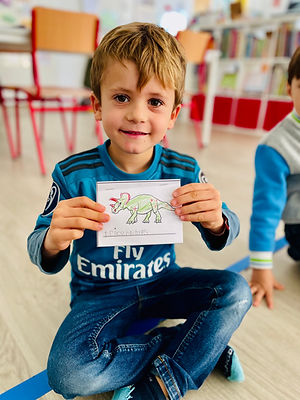
Montessori and English as a Foreign Language
What to expect from Montessori English Academy
A Montessori lesson
Lessons in the environment will be given to small groups of children. Children who have had the same lesson will then be able to follow up the work together if desired. Individual children, nevertheless, will progress at their own rate.
The follow-up work children complete after lessons does not take the form of work sheets, because when children come to the end of a work sheet, psychologically they perceive the work as finished. Without the arbitrary limit set by a work sheet, children become very inventive in designing ways to work with the information or to practice the skill.
Montessori
class age groups
Montessori classrooms around the world excel in peer and group work. At Montessori English Academy the children will be in classes with mixed ages and abilities, native English speakers are welcome to attend classes as well. In this way the younger child can observe the older, and the older profit from now having to help explain things to the younger. It is one thing to know how to do something, and another to be able to explain it. Choice and perceived control are so important because they enhance ownership of process. The teacher can teach all that he or she wants, it's only the student that can learn for him or herself.
Montessori lesson approach
The Montessori approach offers EFLs a student-centered approach to learning, an environment that lowers learners’ anxiety and encourages collaborative learning opportunities. According to current research, the Montessori Method is being defined as a progressive method of teaching EFL students. When children are free to work in this way, they become completely absorbed in large endeavors. Exerting maximum effort and being creative become habit. Each child shall be the protagonist of their learning, having their own personal work journal that will help them track their academic progress.
The main goal in Montessori education is to promote independence and responsibility to the child.
The prepared environment must include a trained adult who observes and assists as appropriate, as well as materials that contain multiple concepts that the children are able to explore by using the hands and the mind together. It is the child's self-directed and purposeful activity that leads to greater independence, concentration and personal growth.
In order to learn effectively, Maria Montessori insisted that children, teachers and parents must have a link with each other for the smooth running of the learning process. This prepared environment of the child becomes more than a classroom, school or academy, it is the community of families and adults dedicated to the work of the child.

What is Montessori?
A Brief Introduction to the Montessori Method
The history of Maria Montessori
Maria Montessori was born in Italy in 1870 and died in the Netherlands in 1952. But she didn't live only in these two countries; she also lived or spent a certain amount of time in Spain, The USA, and in India. A remarkable doctor, qualified physicist, feminist and renewer of education.
Maria Montessori
discovery
Early in the twentieth-century, Dr. Maria Montessori developed and applied a philosophy of human development to education. Dr. Montessori discovered that children love to be engaged in self-directed, purposeful activities and learn best when involved in their self-chosen pursuits.
Why Montessori method works
It is based on observing the activities of the child within a well-defined learning environment. Montessori schools strive to foster confidence and independence in their students. Each classroom has to be adjusted to the children’s demands, with chairs and tables easily moved.

LANGUAGE
Language permeates all areas of the Montessori environment. The purpose of the language materials is to give children ways to describe and to interact with their environment. Learning new words allows children to accurately label objects and people, learn new concepts, and communicate with others.
Students will begin to move from inventive (phonetic) spelling, where the focus is on promoting a love of writing and the ability to communicate about ideas, to a more refined use of spelling, grammar, sentence construction, punctuation, and capitalization. Children will learn to edit their own work, as well as that of their peers. These skills will be developed as the students pursue cultural studies.
CULTURAL SUBJECTS
The Montessori Cultural Studies curriculum is focused on placing a child into the context of their world. This is done in many ways, using historical timelines, biology, zoology, history and geography. Students come to see themselves as part of a larger physical world, and as occupying a certain place in a larger historical context.
Studies of geography, science and all the related disciplines flow naturally from the study of history. The history curriculum provides a chronological framework that orders the information presented in the companion areas of study: geology, biology and science. The starting point in any educational discipline extends back in time, and in this way can be linked to any other discipline area, in this interdisciplinary approach.


MATHEMATICS
The Montessori approach to mathematics allows children to grasp mathematical concepts by first experiencing and manipulating them in concrete form. Children are given as much time as they need to learn from their successes and their mistakes, while also discovering the rewards of perseverance.
The entire purpose of the Montessori Math curriculum is to make the abstract concrete, until the child can close his eyes and visualize mathematical processes at work. Step by step, the materials become less concrete and more symbolic. Montessori uses a wide range of parallel materials and exercises to help the child extend his or her knowledge and gradually memorize the basic math facts that every one of us is expected to know.
Children are human beings to whom respect is due, superior to us by reason of their innocence and of the greater possibilities of their future
Maria Montessori

